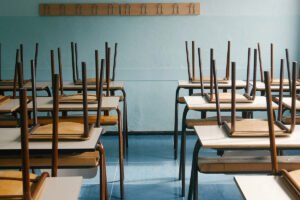
February 2, 2017; U.S. News & World Report and Detroit Free Press
NPQ has written a great deal over the past few years about public education as a playground for mega-philanthropy, including this classic piece from Joanne Barkan. But, in a surprising turn of events this morning, we see that philanthropist Eli Broad has urged that the nomination of Betsy DeVos as education secretary be rejected.
Billionaire philanthropist and public education backer Eli Broad is urging senators to vote against President Donald Trump’s pick for education secretary, Betsy DeVos, saying she is “unprepared and unqualified for the position.”
Broad writes in a letter to senators that if DeVos were confirmed, “much of the good work that has been accomplished to improve public education for all of America’s children could be undone.”
Broad says the country needs an education secretary “who believes in public education and the need to keep public schools public.”
Broad is a political donor to both Democrats and Republicans. The full text of the letter to Senate leaders can be read here. Broad’s concerns about DeVos include her lack of understanding of law and her lack of interest the federal role of education as it applies to equity and the civil rights of students. He’s also adamantly against the prospect of guns in schools.
Broad, as readers will recall, is famous and highly controversial for his staunch advocacy of charter schools in the L.A. area. You can read more about the basis of that controversy here and here.
Returning to the nominee herself, DeVos has pledged to energetically encourage states to fix their public schools using the highly disruptive approach that she championed in her home state of Michigan: Give parents the power to pick the schools their children attend. In theory, this strategy sounds like an easy way to improve school systems. Because parents want only the best for their children, they will select the best schools and shun those that struggle. Schools who find themselves out of favor will either improve or be restructured or closed. Over a short period of time, “market forces” should push the quality of public education into an upward spike.
Sign up for our free newsletters
Subscribe to NPQ's newsletters to have our top stories delivered directly to your inbox.
By signing up, you agree to our privacy policy and terms of use, and to receive messages from NPQ and our partners.
However, on the ground in Detroit, after years of effort, this reality has proved to be neither elegant nor painless. As NPQ has previously covered, Detroit’s underfunded public schools leave much to be desired. State-appointed managers recently informed parents that as many as 25 Detroit public schools may be closed at the end of this school year, allowing their former students to choose their next school—a better school. According to the Detroit Free Press, “Detroit parents whose children attend schools targeted for potential closure…have received a letter from the state suggesting alternatives largely in the suburbs. It raises a sobering reality for Detroit parents: They have few high-performing school options for their kids in the city.”
For school choice to work for all children, better schools need to be accessible to every family, and school administrators need to effectively manage the disruption that changing schools causes in the lives of students and communities. At least in Detroit, both of these challenges may prove more difficult than the hard work of improving the effectiveness of neighborhood schools.
With few better options available within the city of Detroit, parents may be faced with a choice between a better school that is difficult to reach and a poorly performing school closer to home. State officials recognize this is a real problem, but have yet to announce any program that responds to concerns about cost and convenience.
Ashley Joachim with the Center for Reinventing Public Education described the need to manage school closures effectively: “School closures, when they result in kids going to better schools, can be a good thing. But when that doesn’t happen, they negatively affect student achievement.” According to Tonya Allen, president and CEO of the Skillman Foundation, most of the kids in the failing schools live in the neighborhood and walk to school. “We cannot close schools and give them no better alternative,” Allen said. “That’s the predicament we’re basically putting parents in.”
Allen is also concerned that an influx of students from closed schools may end up overwhelming the schools that take them in. “If you go beyond adding 20 percent of students who have come from a low-performing school into a high-performing school, you automatically begin to pull down the performance of that school.”
In the end, it’s easy to close a school down. Ensuring the next school year leads to a better experience for all the affected students is the hard part—one where we see few examples of success.
People who care about public education in this country will be watching the Senate carefully as they vote to confirm or reject DeVos’s nomination, but it is now clear that she would face resistance even among fellow well-heeled charter advocates.—Martin Levine and Ruth McCambridge












